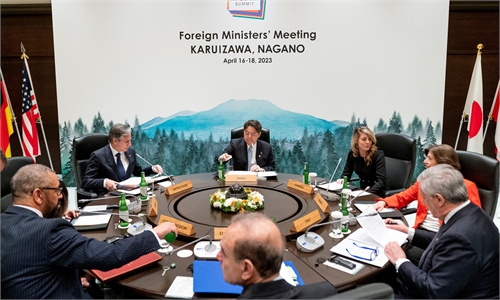Divergences and concerns grow at G7 finance ministers meeting, a preview for US’ failure to besiege China at leaders’ summit

Flags of G7 countries at Palazzo Pitti, Italy Photo: VCG
Under the shadow of the US debt standoff and growing worries of a bank crisis, the meeting of Group of Seven (G7) finance ministers and central bank governors kicked off in Niigata, Japan from Thursday to Saturday.
Analysts noted that divergences will grow at the G7 finance ministers' meeting with US leadership further weakening, and this will also be a preview of the US' failure to rally efforts to besiege China at the upcoming G7 leaders' summit.
The US debt crisis is a key topic for this year's G7 finance leaders' meeting together with other challenges and global economic risks, including high inflation and the fallout from aggressive US and European interest rate increases.
With the Treasury Department indicating that the US could reach the debt limit as early as June 1, US President Joe Biden indicated on Tuesday that a failure may lead to him cancelling his trip to Japan for the G7 summit in Hiroshima from May 19 to 21, Reuters reported.
The debt ceiling is not only the biggest headache for the US but also for other G7 nations. The US economy has been seen as an engine for G7 nations and any dysfunction would deal a blow to them, Lü Xiang, a research fellow at the Chinese Academy of Social Sciences, told the Global Times.
US Treasury Secretary Janet Yellen, who is in Niigata for the G7 finance ministers' meeting, was cited by Reuters on Thursday as saying that "A default would threaten the gains that we've worked so hard to make over the past few years in our pandemic recovery. And it would spark a global downturn that would set us back much further."
However, there is little expectation that the G7 will come up with any effective solution to the US' problems, analysts said.
G7 believes that it can coordinate the global macro-economy, but the prospects for the global economy are gloomy, with global trade shrinking and demand in developed countries sharply declining, which is a sign of recession, said Lü.
The meeting of the G7 finance ministers and central governors is expected to see more disputes as well as concerns, with thorny issues related to the US and global economy unable to be solved. The blow dealt by the financial crisis and a looming recession will further weaken the US' leadership in G7, said the expert.
For example, some Japanese media reported that during the upcoming G7 leaders' summit, the group is considering urging China to help rebuild the international order and "act responsibly."
In response, Chinese Foreign Ministry spokesperson Wang Wenbin told a press conference on Thursday that G7 rarely mentions the UN Charter but always clamors about the "rules-based" international order, dominated by G7 with "America First."
G7 requires China to abide by the international order but is itself a violator of this order, said Wang, noting the US' global spying activities, diplomatic and economic coercion and invasion of Iraq, Afghanistan and Syria.
Aside from pulling together small cliques to contain China, the US is reportedly seeking the support of other G7 nations for its plan to limit investment in key parts of China's economy at the upcoming summit of G7 leaders.
Shu Yuting, a spokesperson with the Ministry of Commerce (MOFCOM), said at a press conference on Thursday that the US' plan to restrict American companies and coerce its allies to limit investment in China severely violates market rules, infringes on the international trade order and destabilizes the global supply chain, which China will take firm countermeasures against.
Although the US is rallying its allies to target China at the G7 meetings and has beefed up efforts to hype decoupling with China and the "China threat," it is doomed to fail in that effort, as shaky leadership means the US is incapable of preventing China from fighting back, said analysts.

